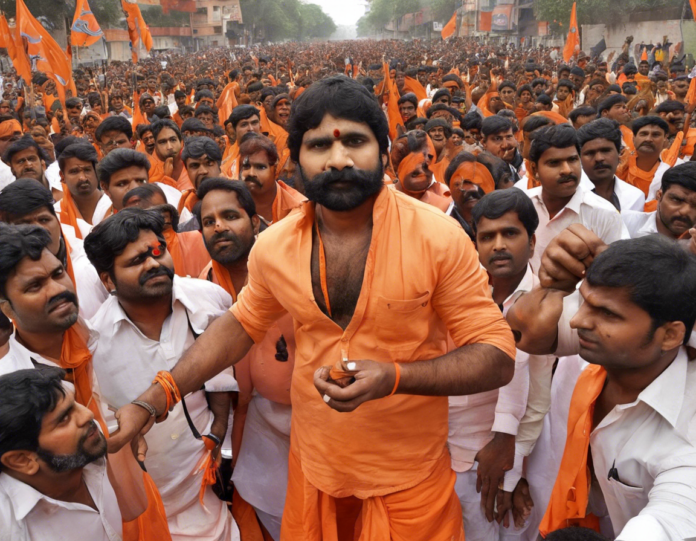In recent years, Bajrang Dal has gained significant attention both in India and globally due to its controversial activities and impact on society. This Hindutva organization, affiliated with the Rashtriya Swayamsevak Sangh (RSS), has been involved in various contentious issues ranging from religious conversions to moral policing. Let’s delve deeper into the controversies surrounding Bajrang Dal and analyze its impact on Indian society.
The Origins of Bajrang Dal
Bajrang Dal was established in 1984 as the youth wing of the Vishva Hindu Parishad (VHP), with the aim of promoting Hindutva ideology and protecting Hindu interests. The organization derives its name from Lord Hanuman, also known as Bajrangbali, a revered figure in Hindu mythology known for his unwavering loyalty and strength.
Controversies Surrounding Bajrang Dal
1. Moral Policing
One of the primary controversies associated with Bajrang Dal is its involvement in moral policing activities. The organization has been known to vigilantly enforce Hindu cultural norms, often resorting to violence and intimidation tactics against couples engaging in public displays of affection or individuals accused of violating traditional values.
2. Religious Conversions
Bajrang Dal has been vehemently opposed to religious conversions, especially conversions of Hindus to other faiths. The organization has been accused of using force and coercion to prevent conversion activities, which has raised concerns about religious freedom and minority rights in India.
3. Violence and Intimidation
There have been numerous allegations of Bajrang Dal members engaging in violent activities, including attacks on religious minorities, journalists, and activists critical of their ideology. The organization’s aggressive approach towards dissent has led to a climate of fear and censorship in certain regions where it holds sway.
4. Ram Janmabhoomi Movement
Bajrang Dal played a significant role in the Ram Janmabhoomi movement, which culminated in the demolition of the Babri Masjid in 1992. The organization’s active participation in the campaign for the construction of a Ram temple at the disputed site in Ayodhya has been a source of religious tensions and communal discord in India.
Impact of Bajrang Dal
1. Polarization of Society
Bajrang Dal’s activities have contributed to the polarization of Indian society along religious lines. The organization’s advocacy for Hindu supremacy and its confrontational stance towards religious minorities have deepened communal divisions and undermined social harmony.
2. Political Influence
Despite being a non-political organization, Bajrang Dal wields significant political influence through its ideological alignment with the ruling Bharatiya Janata Party (BJP) and other Hindutva groups. The organization’s ability to mobilize voters and influence public opinion makes it a key player in India’s political landscape.
3. Threat to Secularism
The rise of Bajrang Dal and similar Hindutva outfits poses a serious challenge to India’s secular fabric. By promoting a majoritarian agenda and marginalizing minority communities, these organizations undermine the pluralistic ethos enshrined in the Indian constitution.
FAQs about Bajrang Dal
1. What is the ideology of Bajrang Dal?
Bajrang Dal propagates Hindutva ideology, which emphasizes the cultural and political dominance of Hindus in India.
2. Is Bajrang Dal a violent organization?
Bajrang Dal has been associated with acts of violence, intimidation, and moral policing, raising concerns about its confrontational tactics.
3. How does Bajrang Dal impact Indian politics?
Bajrang Dal’s alignment with the BJP and other right-wing parties gives it considerable political clout, influencing policy decisions and electoral outcomes.
4. What are the legal implications of Bajrang Dal’s activities?
Critics argue that Bajrang Dal’s actions often flout legal norms, infringing on individual rights and challenging the rule of law.
5. How can the controversies surrounding Bajrang Dal be addressed?
Addressing the controversies surrounding Bajrang Dal requires a multi-faceted approach that includes legal action, public awareness campaigns, and promotion of inclusive values.
In conclusion, Bajrang Dal’s controversial activities and impact on Indian society underscore the complex interplay between politics, religion, and social dynamics in the country. As debates over religious nationalism and secularism continue to evolve, understanding the role of organizations like Bajrang Dal becomes crucial in shaping the future trajectory of India’s socio-political landscape.





